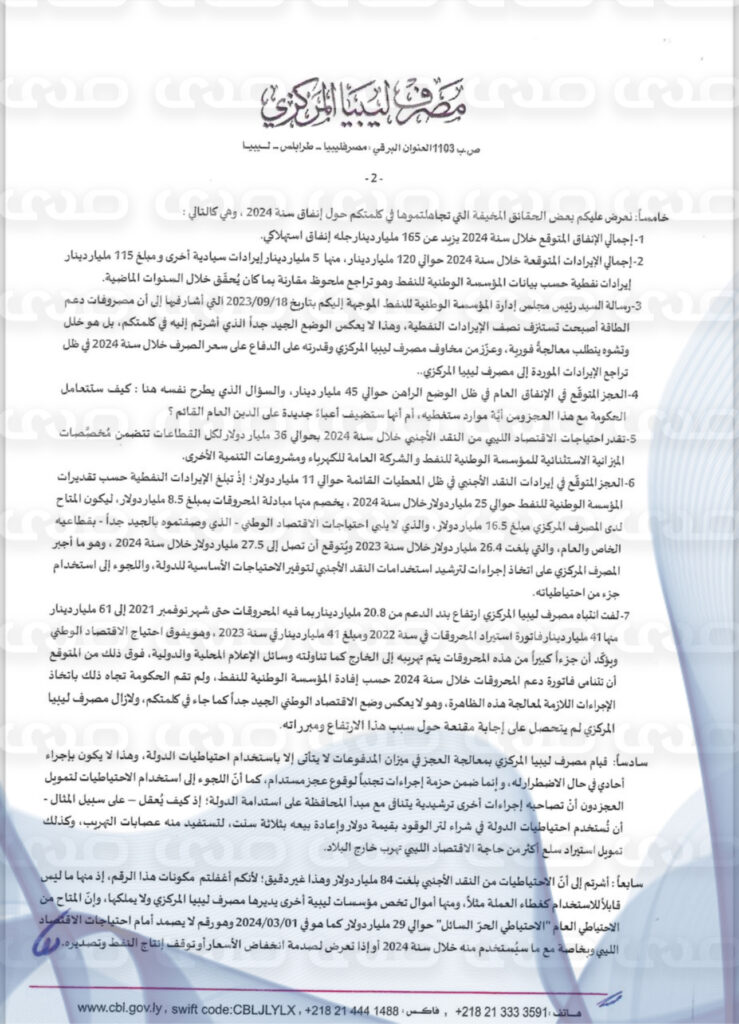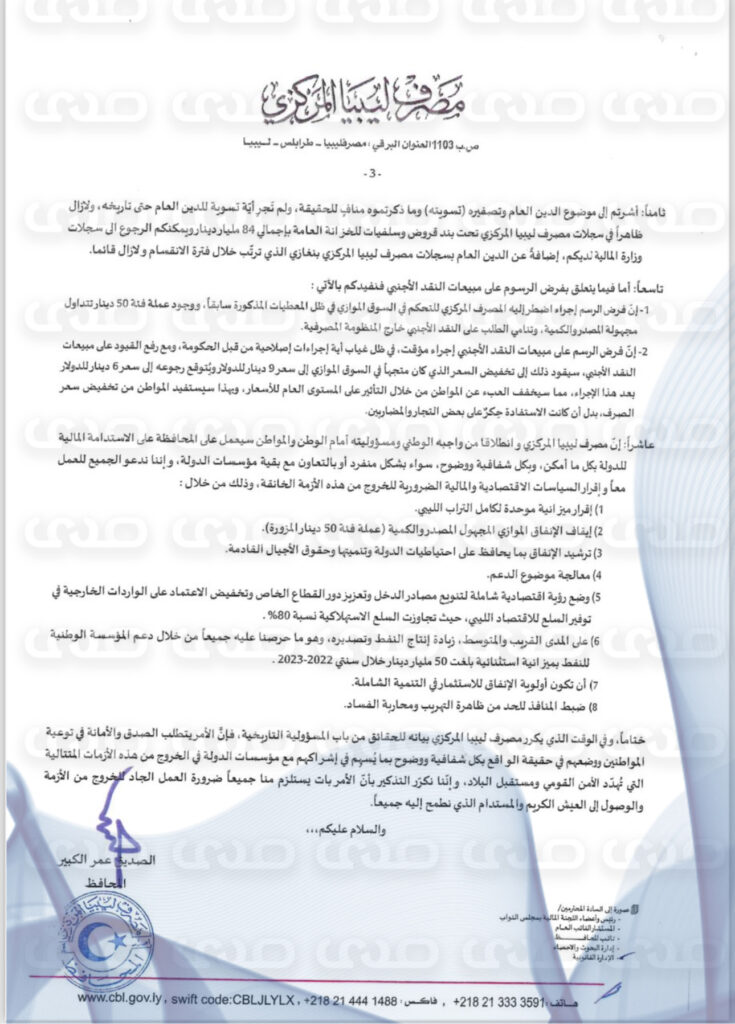The Governor of the Central Bank of Libya revealed in a letter addressed to the Prime Minister of the National Unity Government that the financial and economic policies pursued by successive governments led to imbalances in the national economy.
He continued that the measures and policies taken by the Central Bank in January 2021 led to achieving relative stability and achieving a surplus in the balance of payments and the general budget.
The government did not undertake the accompanying commercial and financial measures in addition to the measures of the Central Bank of Libya.
With the government expanding public spending, especially consumer spending, including salaries, which exceeded 65 billion dinars, the government is expanding spending on support items, grants, and subsidies.
The government did not address the increasing spending on fuel subsidies, while the government expanded employment in the public sector, as the number of employees in the state’s administrative apparatus reached 2.2 million employees, equivalent to 31% of the population, which is the highest in the world.
The government also weakened the role of the private sector in the national economy through ill-considered increases in salaries, and all of the government’s expansionary measures and policies thwarted the efforts of the Central Bank of Libya and affected its ability to maintain the stability of the exchange rate and the value of the Libyan dinar.
Also, the current and previous governments did not present an economic vision to work on diversifying sources of income, and the ministries concerned with financial and trade policy did not present reform programs to enhance economic growth, and natural resources should be better exploited through the private sector to reduce dependence on the oil sector.
Al-Kabeer revealed that the ill-considered expansion in public spending threatens the sustainability of the state’s public finances, and the ill-conceived expansion increases pressure on the exchange rate and inflation rates.
The ill-considered expansion also resulted in an increase in the money supply by more than 30 billion dinars in 2023, reaching 160 billion dinars.
The ill-considered expansion resulted in an increase in demand for foreign exchange, and promoting an ideal image of the national economy without guidance to reality threatens the interests of the nation, the citizens, and the future.
It is expected that total spending during the year 2024 will exceed 165 billion dinars, mostly consumer spending, and the total revenues expected during the year 2024 are about 120 billion dinars, of which 5 billion dinars are other sovereign revenues and 115 billion dinars are oil revenues, according to data from the National Oil Corporation.
This also clarifies the letter of the Chairman of the Board of Directors of the National Oil Corporation addressed to the Prime Minister of the National Unity Government, dated 09/18/2023, in which he indicated that energy subsidy expenses had begun to drain half of oil revenues.
With the depletion of half of oil revenues in the form of energy subsidies, this does not reflect the very good situation that you referred to in your speech, but rather it is an imbalance and distortion that requires immediate treatment.
The expansion of the energy subsidy item reinforced the concerns of the Central Bank of Libya and its ability to defend the exchange rate during the year 2024 in light of the decline in revenues supplied to the Central Bank of Libya.
The expected deficit in public spending for the year 2024 under the current situation is about 45 billion dinars, wondering where the government will cover the expected deficit this year or will it add new burdens to the existing public debt?
The Libyan economy’s foreign exchange needs during the year 2024 are estimated at approximately $36 billion for all sectors, including exceptional budget allocations for the National Oil Corporation, the General Electricity Company, and other development projects.
The expected deficit in foreign exchange revenues for 2024 is about $11 billion.
Oil revenues are expected to be approximately $25 billion in 2024, with a fuel swap discount of $8.5 billion.
The net amount expected to be supplied in foreign exchange to the Central Bank amounted to $16.5 billion, which is insufficient to meet the needs of the national economy.
The national economy’s foreign exchange needs amounted to $26.4 billion in 2023, and are expected to reach $27.5 billion in 2024.
The Central Bank was also forced to rationalize the use of foreign exchange and use part of its reserves to meet the basic needs of the state.
The support item increased from 20.8 billion dinars in November 2021 to 61 billion dinars, including 41 billion dinars in the fuel import bill in 2022 and 41 billion dinars in 2023.
This increase exceeds the needs of the national economy, and indicates the smuggling of a large portion of fuel abroad.
According to the National Oil Corporation, the fuel subsidy bill is expected to increase in 2024, and the government has not taken measures to address this phenomenon.
The Central Bank did not obtain a convincing explanation for the reason for the increase in the fuel subsidy bill and its justifications.
Al-Kabir continued by saying that the Central Bank of Libya needs to use the state’s reserves to address the deficit in the balance of payments, and this measure must be part of a package of measures to avoid a sustainable deficit.
The use of reserves without rationalization procedures contradicts the principle of maintaining the sustainability of the state.
It is also necessary to avoid using reserves for operations such as purchasing fuel at low prices and reselling it at high prices for the benefit of smuggling.
The use of reserves should be directed towards financing necessary imports and preventing smuggling to maintain the sustainability of the country.
The Prime Minister also indicated that foreign exchange reserves are estimated at 84 billion dollars, but this number is inaccurate.
Al-Kabir continued, “Part of the reserves cannot be used as a currency cover, for example, and some of them include funds belonging to other Libyan institutions managed by the Central Bank of Libya that it does not own.”
Continuing that the available general reserve “free liquid reserve” is about $29 billion as of 03/01/2024.
The available general reserve is insufficient to meet the needs of the Libyan economy, especially with expected consumption during 2024 or in cases of potential shocks such as a drop in oil prices or the cessation of oil exports.
He also stated that the Prime Minister’s statements about settling the “zeroing” of the public debt are inaccurate and inconsistent with reality, and that no settlement of the public debt has yet been made, and it is still registered in the records of the Central Bank of Libya.
The records show the existence of loans and advances to the public treasury totaling 84 billion dinars, which can be verified through the records of the Ministry of Finance.
He also reported that the public debt is also registered in the records of the Central Bank of Libya, Benghazi, which were arranged during the period of division and are still in place.
He continued that imposing the fee was a measure that the Central Bank was forced to take to control the parallel market in light of the previously mentioned data, the presence of a 50-dinar currency in circulation of unknown origin and quantity, and the growing demand for foreign exchange outside the banking system.
Imposing the fee on foreign exchange sales is a temporary measure, in the absence of reform measures by the government, and will lead to a decrease in the price of the dollar in the parallel market from 9 dinars to 6 dinars.
Imposing a fee on foreign exchange sales will affect the general level of prices, which will reduce the burden on the citizen.
He stated that the citizen would benefit from reducing the exchange rate, while the benefit was previously limited to some merchants and speculators.
The Central Bank of Libya, based on its national duty and responsibility before the nation and the citizen, will work to preserve the financial sustainability of the state in all possible ways, with full transparency and clarity, whether individually or in cooperation with the rest of the state institutions.
Al-Kabeer called on everyone to work together and approve the necessary economic and financial policies to get out of this stifling crisis, through:
Approval of a unified budget for the entire Libyan territory.
 Stop parallel spending of unknown source and quantity (counterfeit 50 dinar currency).
Stop parallel spending of unknown source and quantity (counterfeit 50 dinar currency).
 Rationalizing spending in a way that preserves and develops the state’s reserves and the rights of future generations.
Rationalizing spending in a way that preserves and develops the state’s reserves and the rights of future generations.
 Addressing the issue of support.
Addressing the issue of support.
 Developing a comprehensive economic vision to diversify sources of income, enhance the role of the private sector, and reduce dependence on foreign imports in providing goods to the Libyan economy, as consumer goods exceeded 80%.
Developing a comprehensive economic vision to diversify sources of income, enhance the role of the private sector, and reduce dependence on foreign imports in providing goods to the Libyan economy, as consumer goods exceeded 80%.
 In the short and medium term, oil production and export will increase, which we are all keen on by supporting the National Oil Corporation with an exceptional budget amounting to 50 billion dinars during the years 2022-2023.
In the short and medium term, oil production and export will increase, which we are all keen on by supporting the National Oil Corporation with an exceptional budget amounting to 50 billion dinars during the years 2022-2023.
 The priority of spending should be to invest in comprehensive development.
The priority of spending should be to invest in comprehensive development.
 Controlling ports to reduce smuggling and combat corruption.
Controlling ports to reduce smuggling and combat corruption.



You can also read the news in the source from the Sada Economic newspaper
#AlKabir #explains #AlDabaiba #numbers #conditions #Libyan #economy #government #caused #result #spending
2024-04-05 01:19:21







